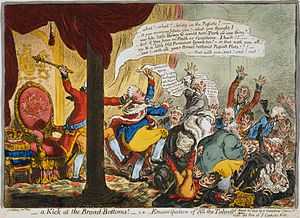Papist

Papist is a (usually disparaging) term or an anti-Catholic slur, referring to the Roman Catholic Church, its teachings, practices, or adherents. The term was coined during the English Reformation to denote a person whose loyalties were to the Pope, rather than to the Church of England. Over time, however, the term came to mean one who supported Papal authority over all Christians; it thus entered widespread use, especially among Anglicans and Presbyterians.[citation needed] The word, dating from 1534, derives (through Middle French) from Latin papa, meaning "Pope".[2]
The word was in common use by Protestant writers until the mid-nineteenth century, as shown by its frequent appearance in Thomas Macaulay's History of England from the Accession of James II and in other works of that period, even those with no controversial intent. It also appeared in the compound form "Crypto-Papist", referring to members of Protestant churches who at heart were allegedly Catholics.[3][4][5]

The word is found in certain surviving statutes of the United Kingdom, for example in the English Bill of Rights of 1688 and the Scottish Claim of Right of 1689. Under the Act of Settlement of 1701, no one who professes "the popish religion" or marries "a papist" may succeed to the throne of the United Kingdom. Fears that Catholic secular leaders would be anti-Protestant arose after the Roman Catholic Church was made illegal in England in the reigns of Henry VIII and Elizabeth I.
Similar terms, "papalism" and "popery", are sometimes used,[6][7][8] as in the Popery Act 1698 and the Irish Popery Act.
Jonathan Swift (1667–1745), author of Gulliver's Travels, employed the term throughout in his satirical A Modest Proposal, in which he proposed selling Irish children to be eaten by wealthy English landlords.
During the 1928 American presidential election, Democratic Party nominee Al Smith was accused of being a papist. He was the first Catholic to ever receive presidential nomination from a major party and this led to fears that, if he were elected, the United States would be ruled by the Vatican.[9] So far, only once, with the election of John F. Kennedy in 1960, has a Roman Catholic become President of the United States, though six of the nine current Supreme Court justices are Roman Catholics.
Although the term is not as common today as in the past, some continue to use it.[10][11]
See also
- Anti-Catholicism
- Anti-clericalism
- Know Nothing Party
- Mackerel snapper
- Popish Plot
- Romanism
References
- ↑ Bulut, Mehmet (2001). Ottoman-Dutch economic relations in the early modern period 1571-1699. Uitgeverij Verloren. p. 112. ISBN 978-90-6550-655-9.
- ↑ papist, Merriam Webster Online
- ↑ Walter Walsh, The Secret History of the Oxford Movement (C.J. Thynnes, 1898), pp. 8 and 187
- ↑ The American National Preacher, August 1851, Sermon DLIII, p. 190
- ↑ Alexis Khomiakhov, a Russian lay theologian of the nineteenth century, wrote, "All Protestants are Crypto-Papists" (James J. Stamoolis (2004). Brad Nassif, ed. Three views on Eastern Orthodoxy and evangelicalism. Zondervan. p. 20. ISBN 0310235391.).
- ↑ Dr J. J. Overbeck and His Scheme for the Re-establishment of the Orthodox Church in the West
- ↑ http://www.thefreedictionary.com/popery
- ↑ http://www.merriam-webster.com/dictionary/popery
- ↑ Michael O'Brien, John F. Kennedy: A Biography, Thomas Dunne Books, 2005, p. 414.
- ↑ Vladimir Moss, Letter to a Papist
- ↑ Ian Paisley, Papist Doctrine of Oaths